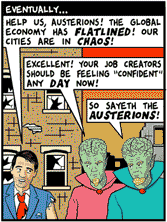This will be brief. I’m in the middle of a take-home mid term in Semantics. (Still a student at 54; Christ on a freaking bike.) Anyway…
Today is the day that extended SNAP (food stamp) benefits expire. Happy Halloween, everybody! SNAP was allocated some additional money in the stimulus package, way back in early 2009, when it almost seemed possible that our national government would do what needed to be done to rescue the economy. The assumption back then was that the economy would be generating enough prosperity by this time that SNAP benefits wouldn’t be needed. Obama’s chief economic adviser at the time – a certain Dr. Pangloss, I believe – was certain Congress and the president would remain committed to putting people back to work.
 Then, of course, the Austerians came to power in 2011 and set us on the righteous path of Japan in the 1990s – the path we are crawling along today on our bloody hands and knees. Millions are still out of work, millions more under-employed with zero security, many more working their asses off and still needing SNAP benefits, still needing the support of food pantries. These millions of people are now the favored target of the Austerians. If people are in need, surely it’s their fault and not the fault of policymakers who will do anything rather than invest in economic growth. SNAP has grown to $80 billion a year! they exclaim. What’s their solution? Allocate money for, say, public works projects while interest rates are low so that we can repair and replace our aging infrastructure, invest in our future, and create jobs? God, no! Cut SNAP by $40 billion.
Then, of course, the Austerians came to power in 2011 and set us on the righteous path of Japan in the 1990s – the path we are crawling along today on our bloody hands and knees. Millions are still out of work, millions more under-employed with zero security, many more working their asses off and still needing SNAP benefits, still needing the support of food pantries. These millions of people are now the favored target of the Austerians. If people are in need, surely it’s their fault and not the fault of policymakers who will do anything rather than invest in economic growth. SNAP has grown to $80 billion a year! they exclaim. What’s their solution? Allocate money for, say, public works projects while interest rates are low so that we can repair and replace our aging infrastructure, invest in our future, and create jobs? God, no! Cut SNAP by $40 billion.
The Democrats, true to form, have an alternative to this draconian policy: Cut $4 billion from SNAP. Screw the poor, only not so much; that’s their considered answer. Now they’ll work on a compromise that will cut somewhere, I suspect, closer to the GOP number. While they hash this out, today’s expiration of the SNAP extension means the average family receiving the benefit will get $35 less a month with which to feed their families. This makes an enormous difference to families already on the edge.
This is why we suck. Let’s just stop sucking, right?
luv u,
jp

 When that happens, people inevitably look for someone to blame. Lately that someone has been unionized public employees. Sad to say, my fellow Americans are all too quick to think the worst of them. That’s not surprising. A lot of editorial ink, political rhetoric, and advertising resources have been placed against vilifying the very notion of working for government. It’s a waste of money, they’re a bunch of lazy layabouts who can’t make it in the private sector, etc., etc. For a long time that blanket criticism seemed confined to, say, the people down at the DMV, but in recent years it’s been expanded to teachers and even public safety employees.
When that happens, people inevitably look for someone to blame. Lately that someone has been unionized public employees. Sad to say, my fellow Americans are all too quick to think the worst of them. That’s not surprising. A lot of editorial ink, political rhetoric, and advertising resources have been placed against vilifying the very notion of working for government. It’s a waste of money, they’re a bunch of lazy layabouts who can’t make it in the private sector, etc., etc. For a long time that blanket criticism seemed confined to, say, the people down at the DMV, but in recent years it’s been expanded to teachers and even public safety employees.